Forestry is one of several industries that complement the arable farming elements of Farming Simulator 22. There’s a lot to planting trees, understanding yields, harvesting wood, and putting it into the production line for things like furniture and wood chips. This tips and tricks guide hopes to help you get your forest industry up and running.
Farming Simulator 22 Forestry Tips and Tricks
No matter how fun farming is or how engrossing animal husbandry can be, there’s just something about forestry work that feels so exciting and primal. Maybe it’s the massive machinery or the sound of the chainsaw as it makes purchase into that mighty oak tree I love so much. Whatever it might be, Farming Simulator 22 has done a good job capturing it and bringing it to life.
How Long Does it Take Trees to Grow in Farming Simulator 22?
The short answer is that most trees take 2.5 years to grow and reach their largest size in Farming Simulator 22. That excludes poplars, which take 16 months to mature fully and aren’t the best choice for those focusing on forestry. If you need to know how to buy land for this, we have a guide right here.
Farming Simulator 22 Trees List & Yield by Type
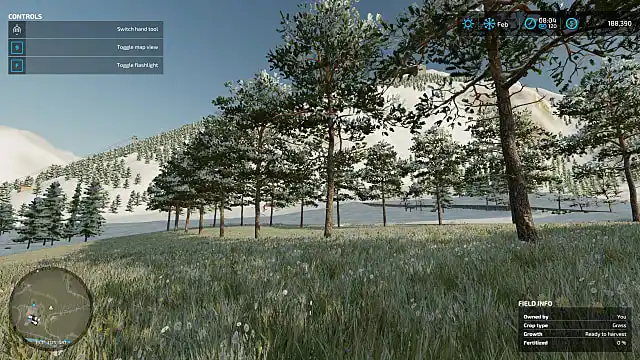
If you’re wondering what trees you can grow on your land to start your forestry industry in Farming Simulator 22, the list is pretty expansive. There are 12 tree types. I list them below with the average height and liter output:
- Pine: 32m | 6300L
- Stone Pine: 26m | 14,000L
- Spruce: 34m | 8200L
- Birch: 13m | 2300L
- Oak: 15m | 12,000L
- Willow: 8m | 3700L
- Maple: 12m | 6200L
- American Elm: 17m | 21,000L (these are challenging to log)
- Pagoda Dogwood: 8m | 600L
- Shagbark Hickory: 20m | 9000L
- Cypress: 13m | 500L
- Downy Serviceberry 7m | 300L
Of the spruce and pine, spruce has, on average. a slightly larger yield than pine trees, but they are far from the highest-producing trees. The American elm tops the forestry charts with an average of 3x more useable wood than the spruce. Willow, dogwood, cypress, and the downy serviceberry should be avoided as they have incredibly low yields.
How to Plant Tree Samplings
- To select from these trees for forestry, go to the store and choose the tabs labeled Objects -> Pallets -> Tree Saplings. Then choose from the available options from the scroller bar in the top right of the page.
- To plant these saplings, you’ll need the Damcon PL-75, which can be found in the Forestry Equipment tab and a tractor capable of powering/pulling it.
Planting your tree saplings is as easy as loading them up, heading out to a parcel of land that you own, and just planting them. You don’t have to plant them on a plowed field or do anything special to them. They don’t require watering or fertilizing. They only need time to grow. Forestry is best suited for slightly irregular areas found in some of the farmland plots that aren’t exactly suited for making a field.
But What About Poplars for Forestry?
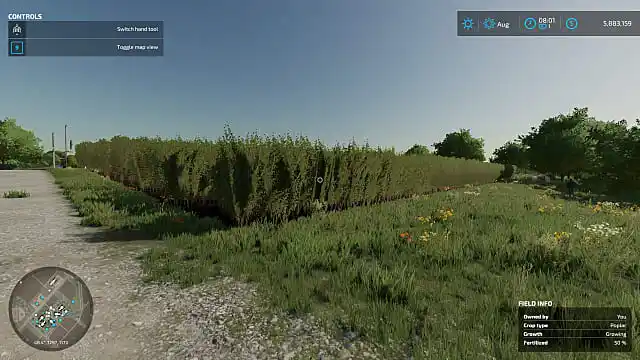
Poplars are like pseudo forestry in Farming Simulator 22; I don’t even think they should count, but here we are. You use the same planter as you do for other trees but instead, buy poplar saplings to plant.
Poplar saplings must be planted on a field that you own, but you don’t have to cultivate the field or worry about weeding it or fertilizing them. Poplars grow faster than regular trees, fully maturing after 16 months in-game. They have the added benefit of regrowing themselves after harvest in the same way that grass does.
The drawback to poplars when it comes to forestry, however, is that they’re only good for being turned into wood chips or into poplar bales. You can’t use poplars like you can logs from the other trees, and the sale value is pretty dismal, so keep that in mind before you sacrifice one of your fields for poplars.
How to Cut Down Trees
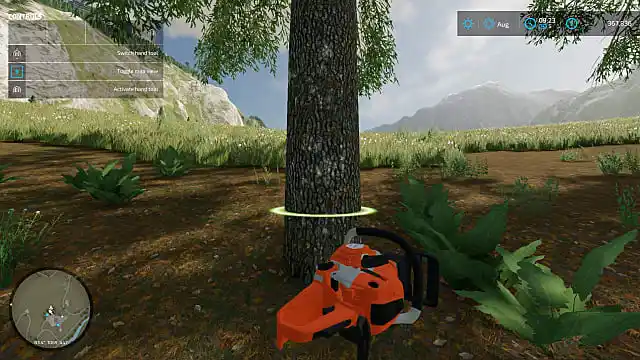
Every tree can be cut down with a chainsaw. However, it’s worth noting that only spruce and pine can be cut down with a harvester like the Rottne H21D, which is the best harvester for anything forestry. The other two available harvesters can struggle with fully-grown spruce trees.
Forestry 2.0: Using Trees in Production
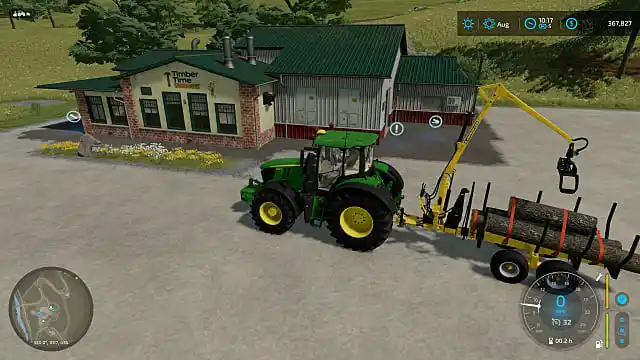
The Carpentry Shop is essentially the starting production facility when it comes to forestry. It can take raw lumber and turn it into more profitable furniture right away.
Not only does the Carpentry Shop supplement forestry by making furniture that generally sells for about $3,000 USD per pallet, but it also generates a small quantity of wood chips on the side. At $60,000 USD, it’s a bit pricey. It also requires a bit of building space. But it’s a great way to start getting into the higher-dollar value production.
For the small investment of $100,000 USD, you can buy the Sawmill to really get your lumber empire going. The Sawmill cuts logs into planks.
The planks can either be sold to a carpentry shop you don’t own or at the supermarket. They can be used in the more efficient production recipe for furniture at your player-owned carpentry shop. It’s one of your main forestry moneymakers.
It also produces some wood chips as a bi-product. Wood chips are great because they don’t go to waste and can get sold for additional income either to other selling points on the map or to the $40,000 USD Biomass Heating Plant.
Currently, this is as far as the production line goes for forestry in the base game of Farming Simulator 22, but once the modding tools become available to the community, players can look forward to some more options when it comes to this industry type given the heavy interest in forestry mods in Farming Simulator 19 from groups like FDR Logging. For more, check out our other Farming Simulator 22 guides.

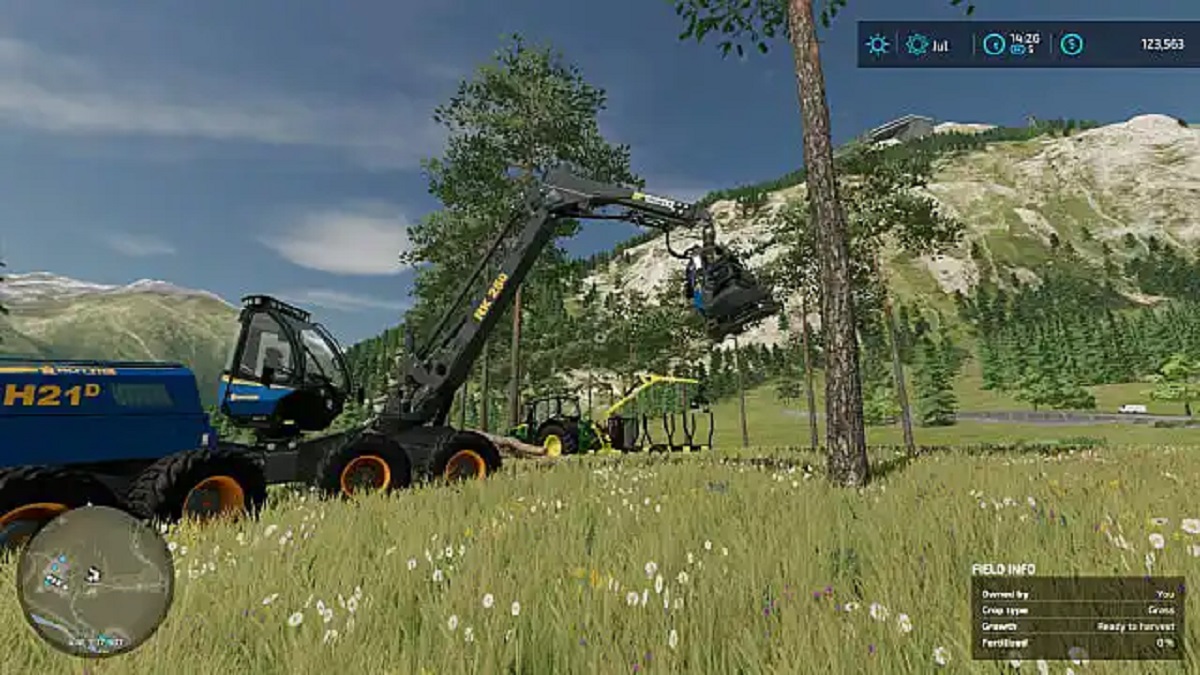








Published: Aug 1, 2023 9:04 PM UTC